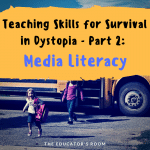 Summer Learning Loss is the bane of every teacher’s existence. We work tirelessly to teach students reading and writing strategies, grammar concepts, vocabulary building techniques, critical thinking skills, and more and it seems that by September they have forgotten what Venn Diagram is and how to find a noun. I know I do endless work with my junior high students to get them reading and writing at higher levels than what they were when they walked in my door in the fall.
Summer Learning Loss is the bane of every teacher’s existence. We work tirelessly to teach students reading and writing strategies, grammar concepts, vocabulary building techniques, critical thinking skills, and more and it seems that by September they have forgotten what Venn Diagram is and how to find a noun. I know I do endless work with my junior high students to get them reading and writing at higher levels than what they were when they walked in my door in the fall.
But research shows that the average student loses about two months of grade level equivalency in math and kids of low-income families lose even more in math and reading. Research done by John Hopkins School of Education supports this information as well.
Many school districts work to fill these gaps by encouraging kids to read over the summer. Some districts–like my son’s–even assigns “Summer Stretch” homework that reviews writing, reading, and math skills. But let’s face it: the word “homework”–especially in the summer–makes even the most studious kid cringe.
Reading with our kids is the best way to combat summer learning loss in that area, but what about writing? No one wants to write a big essay on the Fourth of July. Here are a few things teachers can encourage students (and their families) to do all summer:
Correspondence Journals:
My six-year old son and I have a notepad we pass back and forth all week-long between us with little notes to each other. This week I wrote, “I am so excited for your birthday! Are you?” And he wrote back, “YES! I hope I get toys and Pokemon!” This is totally appropriate for a kid going into first grade. For older kids, you can write longer notes to each other a few times a week.
Writing Prompts:
It doesn’t have to be daily, but put some writing prompt choices in a prominent place and have everyone in the house write about it. Then share out loud at the end of the week. It’s always revealing to see how each family member takes a different view on a prompt! My son has three choices to pick from each week in his Summer Stretch Homework. This week he wrote about what pet he would choose if he could. Three sentences is appropriate for his age, more for older students.
Social Media:
Start a blog that you post to weekly and have students come by and comment. Engage each other by asking questions and responding all summer long. This is not just a great way to keep everyone writing, but to keep everyone connected during the summer months as well. For the older students, you could also start a Facebook page for your class and engage students that way. It’s a great way to also keep in touch with former students. Some older kids may even like to start their own blog.
Vacation (or something else) Proposal:
Kids should write up a persuasive paragraph (or more) proposing a vacation or family outing. Read each aloud and the winner gets to do his/her plan! This is a great family activity because if the outing is something more involved, everyone can be part of the critical thinking of how to accomplish it.
Old-Fashioned Letter Writing:
Have students write letters to their teachers or grandparents or anyone else and then actually mail them. They can include drawings or pictures too. This is a wonderful way to connect with someone of a different generation. Letter-writing is a lost art that has brought joy to so many over thousands of years.
Great teachers know that “students who don’t read [fusion_builder_container hundred_percent=”yes” overflow=”visible”][fusion_builder_row][fusion_builder_column type=”1_1″ background_position=”left top” background_color=”” border_size=”” border_color=”” border_style=”solid” spacing=”yes” background_image=”” background_repeat=”no-repeat” padding=”” margin_top=”0px” margin_bottom=”0px” class=”” id=”” animation_type=”” animation_speed=”0.3″ animation_direction=”left” hide_on_mobile=”no” center_content=”no” min_height=”none”][or write] suffer word poverty,” as Penny Kittle has said. If we can prevent the summer loss, we can also work to prevent word poverty.
[/fusion_builder_column][/fusion_builder_row][/fusion_builder_container]






Leave a comment